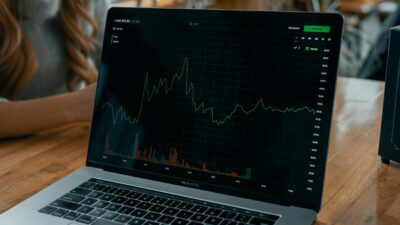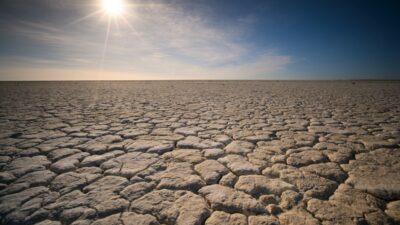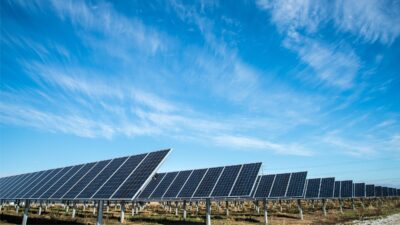Energy is critical to economic, social and environmental well-being. In this what if podcast set two years into the future in January 2019, we explore how the election of Donald Trump as US president has radically changed the trajectory of US and global energy markets.
Associate Professor Jane Lê and Professor Christopher Wright discuss how this major political outcome shapes energy futures. Our what if podcasts are an invitation to imagine and explore complex implications of potential dramatic change on the future of business.
This podcast was recorded before Donald Trump’s inauguration in January 2017.
You can subscribe to this podcast on iTunes, Spotify, Soundcloud, Stitcher, Libsyn, YouTube or wherever you get your podcasts. You can follow us online on Flipboard, Twitter, or on sbi.sydney.edu.au.
Sandra Peter Introduction: Energy is critical to economic, social, and environmental well-being. Our what-if episodes imagine and explore potential futures. In this podcast set two years into the future, in January 2019, we explore how the election of Donald Trump as US president has radically changed the trajectory of US and global energy markets. Our what-if podcasts are an invitation to explore complex implications of potential dramatic change on the future of business.
Introduction: From the University of Sydney Business School this is Sydney Business Insights. The podcast that explores the future of business.
Sandra: I'm Sandra Peter and today we are talking to Associate Professor Jane Le and Professor Christopher Wright to imagine how this major political outcome might shape energy futures. Jane Le is Associate Professor in Work and Organisational Studies at the University of Sydney Business School. She researches competing demands at work with a particular interest in critical infrastructure and is currently leading an AFC project on energy security. Christopher Wright is Professor of Organisational Studies at the University of Sydney Business School. He researches business and sustainability with a focus on climate change.
This podcast was recorded before Donald Trump's inauguration in January 2017. Welcome Jane. Welcome Chris.
Jane: Thank you.
Christopher: Pleasure to be here.
Sandra: Here we are on January 20th 2019. Can you give us an overview of President Trump's energy policies?
Jane: Well we're about two years in and so we've seen quite some dramatical changes. He hasn't disappointed on the revolution of providing some big changes quickly. And I guess in particular what’s been noticeable is the shift towards energy security and away from the climate change again that agenda that we've seen in the past administration. So really a focus on US energy independence, on growing US production and obviously rolling back some of the restrictive environmental policy. So we've seen progress in all of those areas.
Christopher: Yeah I think one of the most remarkable changes that we've seen in the last two years has been the way that the federal government has wound back a lot of environmental protections that have been established in the US over 60 years really since the late 1960s. And you're now seeing parts of the United States that probably more closely resemble parts of China in terms of some of the sort of local environmental destruction, rivers that are far more polluted than they used to be, the mountaintop removal that the coal mining industry is pushing through, and of course gas fracking pretty well everywhere in the Midwest of America. So it's a pretty stark and very changed landscape from the US that we saw back in 2015/2016.
Sandra: So how is this different to President Obama's legacy?
Christopher: Well President Obama pushed the whole agenda on climate of course with his famous agreement with China in the lead up to the Paris climate agreement. That was something that I think that Obama was trying to push through over the two terms of his presidency trying to on the one hand promote American energy independence. But on the other hand deal with this increasingly catastrophic issue of anthropogenic climate change and so the agreement with China was hailed by pretty well the whole world as a real step change in American energy and foreign policy that they were now onboard with climate. They were going to get quite aggressive around emissions reductions. And so there was a lot of hope post Paris that this was going to be the start of the big shift. Unfortunately as we all know now of course President Trump came to power in 2016/2017 and he's walked away from the climate agenda and really doubled down on fossil fuel expansion in domestic US. And that's really put the kibosh on Obama's legacy I think.
Sandra: Can we talk more about what this means for energy independence.
Jane: Even back when he was campaigning a few years ago he was very strong on US independence and even his initial energy plan it was called an America First energy plan. So he was really about putting what he would say as American interests back on the agenda. So it was all about having zero import from what he would call hostile nations not being held hostage by OPEC and he even talked about being the dominant energy power. Some of that has come to fruition. We've seen an increase in production that we're going to talk about a little bit more later. But the result of that has been less reliance on imports, with international agreements and the time it takes to start developments, we haven't seen that independence quite yet and I certainly wouldn't say it is the dominant nation in energy yet but we certainly see a lot of development moving in that kind of direction.
Christopher: Yeah I would just add to that it this much trumpeted claims that this would lead to the rejuvenation of the American coal industry simply hasn't come to pass. And that's largely because the global economy has moved in - this is based on technology and markets - has moved much more towards lower emissions energy production gas but also renewables and nuclear. So it was always unlikely that President Trump was going to be able to rejuvenate the coal industry when the decline of the coal industry was being driven by more fundamental technological and market changes. And that's really what we've seen. These companies like Peabody Coal they had that little fillip in their share price when Trump came to power. But they haven't recovered. And the coal industry is still moribund in the US and globally of course as countries like India and China double down on renewables as the sort of the path forward.
Sandra: Can we talk a bit more about U.S. energy production as well as impact in manufacturing and agriculture?
Jane: Yeah I think this was one of the big things that he has been pretty successful in. So he's reduced a lot of the regulatory of areas, he's reduced business tax, he's brought some investment certainty by sending very strong signals to the market that he would approve and continue to support energy development projects. So we've certainly seen much more interest in the US market and as a consequence much more local production. In particular we see more coal mining, the fracking industry is absolutely taking off in the last two years with the approval of the projects. This is all supported by infrastructure. You know when he approved the Keystone XL Pipeline within five days of coming to the office that just made a huge impact on the market and is continuing to drive the production.
Christopher: The other side to that I guess is the way in which federal and state governments have cracked down on opposition to these new infrastructure projects, so the sort of protest we saw in North Dakota against the oil pipeline there by the indigenous Americans, all of that has basically disappeared pretty quickly after Trump came to power really in that civil disobedience in opposition to these new fossil fuel developments, these new oil pipelines, has really been quashed pretty dramatically. And that's kind of sad when you think where we were heading in pushing back against that fossil fuel expansion in the US.
Jane: Well we have to say there's been some restrictions right, so some of the state governments have pushed back in with them being responsible for some of the development at that more regional level that has created some issues. So Trump definitely hasn't achieved his very ambitious early plan that he set out and he certainly has been slowed down. He was saying that he would actually want to have zero imports. And actually you're still pretty close to the 40-50 per cent mark at the moment, despite the increased production, because with some return of manufacturing and some additional farming that has also increased the demand of energies. They're not really in much better position than they were two years ago. Although there is a potential trend that in the future that could be more production more independence.
Christopher: And just look at California. I mean California has basically gone ahead in leaps and bounds on renewable investment and push back against that federal fossil fuels agenda was pretty sad watching Miami flood again with those big tides and they've got a State Governor who keeps pushing back on that message. And of course they opened up fracking in the Everglades which was a pretty terrible thing so there's a mixed picture essentially and there's some states that are pushing back against President Trump's energy agenda.
Sandra: What's the broader picture around environmental protection?
Jane: That's been probably the single biggest impact and I think everybody was expecting that to happen. What has he done? Well he's rolled back the energy environmental policies he could that weren't proposed by state governments for example, he has approved some of the projects that were on hold like for example pipeline developments. Midstream companies in the US they're just booming at the moment with all the development of pipelines and transport I mean that's great for them economically but it has an environmental impact. And then of course the fracking in sensitive areas and also oil drilling in the Atlantic. I mean that was a big surprise for me that was approved I didn't think they would get it past the regulators.
Christopher: Yeah that was a big shock. The impacts on the Clean Water Act and the Clean Air Act I mean that's being wound back he's got now control of the Supreme Court with those new appointments and they look like they're going to pass judgments soon in ways that further wind back those very basic environmental pieces of legislation. As we were saying there are some state regimes which are putting in place sort of state based protections. It's pretty grim at the federal level. It's a move back really to the sort of 1950s scene where you saw rivers in Ohio catching on fire. We're not far away from seeing that sort of thing repeating itself.
Sandra: We spoke about a few areas of impact. But I want to focus now on what does this mean for trade and international relations?
Jane: Oh yes that's been interesting over the past two years hasn't it? We've seen a lot of development in that area. So obviously you know with a very US centric focus you don't make that many friends internationally. You know it's always been about trade and collaboration. And he's been really openly hostile to trade agreements. So as a result of that reneging on some international commitments and trying to get a better deal for the US and renegotiating some of those contracts has created a lot of issues. So I'd say there's certainly tension with, particularly with Europe, but also with China and parts of Asia. What do you think Chris?
Christopher: I wasn't surprised because it was being murdered soon after he was elected. But for me the big change has been the way in which the EU and China have basically put in place a carbon based trade levy on American goods and that's had a huge impact on American industry. I don't think they were expecting that. In a sense they've basically taken Trump at his word and said well you’re going to move away from free trade, we're going to put a price on your products that are getting a free ride because you're not cutting your emissions so you need to be penalised for that.
Sandra: Where do we think the future is heading?
Jane: From a US perspective at the moment I mean we're two years into the term, we don't see a change in policy. So it looks like there's a very clear forward direction. So continue to focus on U.S. production try to achieve that independence. But I think we are starting to see a little bit more pragmatism in terms of you know having to listen to some of the international concerns because there are now real impacts for the U.S. in terms of trade penalties and restrictions. And I think that's going to have to kerb some of the enthusiasm in the U.S. for this kind of U.S. centric model. But I guess we're going to see, what do you think Chris?
Christopher: Like you say halfway through, his popularity's really crashed. So he's way down in the polls. Be interesting to see whether that plays through to the next election whether he'll just be a one term president or not. That certainly seems to be where it's heading. And there's a lot of consternation that all of the expectations his supporters had of him, he's really failed to deliver on a lot of that. So I don't know, I see him being a one term president, looks fairly likely at this stage.
Jane: Yeah I think that's an interesting thing because energy was one of the core areas that he was pushing and from that he was promising all these extra jobs, revival of industries and that hasn't materialised in the way that people were expecting. So I think a lot of the anger that was driving the election and the kind of needs that people had for change actually still exists. So I think Chris is probably right on this one. Let's see what happens in two years hey we weren't expecting this election result.
Sandra: Let's see what happens. Jane and Chris thank you very much.
Christopher: Pleasure thanks.
Jane: Thank you.
Sandra: Our what-if podcasts imagine and explore potential futures. This podcast was set two years into the future in January 2019 and we explored how the election of Donald Trump as US president has radically changed the trajectory of U.S. and global energy markets. This podcast was recorded before Donald Trump's inauguration in January 2017.
Outro: You've been listening to Sydney Business Insights the University of Sydney Business School podcast about the future of business. You can subscribe to our podcast on iTunes, SoundCloud or wherever you get your podcast and you can visit us at sbi.sydney.edu.au and hear our entire podcast archive, read articles and watch video content that explore the future of business.








